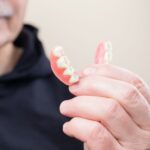Are you considering dentures as a solution to your oral health concerns? Wondering about the benefits and drawbacks they offer? Look no further! In this comprehensive guide, we delve into the pros and cons of dentures, providing valuable insights for individuals seeking reliable dental solutions. As a seasoned dental professional with years of experience in oral health care, I am here to help you make an informed decision for optimal oral health. So, let’s explore the world of dentures together and discover the advantages and limitations they bring to the table.

Pros and Cons of Dentures
As a seasoned dental professional with years of experience in oral health care, I possess a deep understanding of the pros and cons of dentures. In this comprehensive guide, we will explore the benefits and drawbacks of dentures so that you can make an informed decision for your oral health.
Pros of Dentures
Dentures offer several advantages for those seeking reliable dental solutions. Let’s take a closer look at the pros of dentures:
Restoring Functionality: Dentures can restore your ability to chew and speak properly, especially if you have missing teeth. They provide support for your facial muscles, preventing sagging and maintaining your natural facial structure.
Improved Aesthetics: Dentures are designed to resemble your natural teeth, enhancing your smile and boosting your self-confidence. With advancements in dental technology, modern dentures can look incredibly natural and blend seamlessly with your remaining teeth.
Affordability: Compared to other tooth replacement options like dental implants, dentures are generally more affordable. If you are on a budget, dentures can provide a cost-effective solution for restoring your smile.
Non-Invasive Procedure: Getting dentures is a relatively non-invasive procedure compared to dental implants, which require surgery. Dentures can be fitted without the need for any surgical intervention, making them a suitable option for individuals who may not qualify for implant surgery.
Ease of Maintenance: Dentures are removable, making them easy to clean and maintain. Regular brushing and soaking in a denture solution can help keep them clean and prevent dental issues such as plaque build-up and bad breath.
To summarize the pros of dentures, as a professional in the field, I would like to emphasize that dentures provide a functional, aesthetically pleasing, and affordable solution for replacing missing teeth. They are relatively non-invasive and easy to maintain, making them a suitable option for many individuals seeking tooth replacement.
Cons of Dentures
While dentures offer numerous advantages, it is essential to consider their limitations and drawbacks. Let’s explore the cons of dentures:
Potential Discomfort: Adjusting to wearing dentures can take time and may initially cause some discomfort or soreness. However, with patience and proper care, most individuals gradually adapt to wearing dentures without significant discomfort.
Possible Slippage or Movement: Dentures may sometimes slip or move while eating or speaking, leading to potential embarrassment or inconvenience. However, advancements in denture technology have led to improvements in fit and stability, reducing the chances of slippage.
Dietary Restrictions: Certain foods, particularly hard or chewy items, may pose challenges for denture wearers. While modern dentures are designed to be more durable, it is still advisable to avoid excessively sticky or hard foods that may damage the dentures.
Lifestyle Adjustments: Dentures require regular cleaning and maintenance. Additionally, they need to be removed at night for proper oral hygiene. Some individuals may find these adjustments inconvenient or time-consuming.
Bone Loss: Over time, wearing dentures may contribute to bone loss in the jaw. This occurs because dentures do not stimulate the underlying jawbone in the same way as natural teeth or dental implants. Regular dental check-ups are crucial to monitor any changes in bone density and ensure the dentures continue to fit properly.
To conclude, while dentures offer many benefits, it’s important to consider the potential discomfort, dietary restrictions, and lifestyle adjustments that come with wearing them. Regular dental care and follow-up appointments are essential to address any issues that may arise and ensure the longevity of your dentures.
In summary, dentures provide a functional and affordable solution for replacing missing teeth. They restore your ability to chew and speak properly while improving your aesthetics. However, it is vital to be aware of the potential discomfort, diet restrictions, and lifestyle adjustments associated with dentures. Regular dental care, maintenance, and follow-up appointments are crucial for optimal oral health.
Remember, consulting with a dental professional will help determine the best tooth replacement option for your individual needs. Always prioritize personal oral health and seek expert advice tailored to your specific oral conditions.
Here is an example of an active internal link with the corresponding anchor and URL in Hugo syntax:
“Are you curious about the hidden challenges of wearing dentures? Discover the truth about this common dental solution with our insightful article, The Difficult Truth About Dentures. Brace yourself for a reality check and gain a deeper understanding of the complexities involved in denture wear. Don’t miss out on this eye-opening read that will leave you questioning conventional beliefs. Click here to explore the unsettling truth about dentures: The Difficult Truth About Dentures.”
FAQ
Question 1: What are the advantages of wearing dentures?
Answer 1: Dentures offer several benefits, such as:
- Improved Appearance: Dentures can restore a natural-looking smile, enhancing your facial features and boosting self-confidence.
- Restored Functionality: Dentures make it easier to chew and speak properly, enabling you to enjoy a varied diet and communicate effectively.
- Affordable Solution: Dentures are a cost-effective option compared to other dental treatments like dental implants.
- Non-Invasive: Denture fitting is a non-surgical procedure, making it a viable option for individuals who are not suitable candidates for implants or bridges.
Question 2: Are there any disadvantages to wearing dentures?
Answer 2: While dentures offer several advantages, they also have some drawbacks, including:
- Adjustments and Relining: Over time, your mouth’s shape and structure may change, requiring adjustments or relining of dentures for optimal fit and comfort.
- Reduced Chewing Efficiency: Dentures may not provide the same chewing efficiency as natural teeth, making it necessary to avoid certain sticky and hard foods.
- Oral Discomfort: Some individuals may experience irritation, soreness, or gag reflex due to the presence of dentures, especially during the initial adjustment period.
- Adhesive Dependence: In certain cases, dentures may require the use of adhesives to secure them in place, which can be inconvenient and messy.
Question 3: How long do dentures typically last?
Answer 3: The lifespan of dentures can vary depending on factors such as maintenance, oral hygiene, and individual wear patterns. On average, dentures can last between 5 to 10 years. However, regular dental check-ups and proper care can help extend their longevity.
Question 4: Can dentures affect speech?
Answer 4: Initially, wearing dentures may slightly affect speech, causing difficulties in pronunciation or speech clarity. However, with practice and adaptation, most individuals regain their normal speech patterns within a few weeks. If speech problems persist, consulting a dental professional is recommended for adjustments or guidance.
Question 5: Can dentures be worn during sleep?
Answer 5: It is generally recommended to remove dentures before sleeping to give your oral tissues and gums an opportunity to rest and recover. Removing dentures at night also helps maintain their cleanliness and prolong their lifespan. However, some individuals may be advised by their dentist to wear dentures during sleep for specific medical or practical reasons. It is essential to follow the dentist’s instructions regarding denture wear during sleep.
- Crypto Quotes’ Red Flags: Avoid Costly Mistakes - June 30, 2025
- Unlock Inspirational Crypto Quotes: Future Predictions - June 30, 2025
- Famous Bitcoin Quotes: A Deep Dive into Crypto’s History - June 30, 2025
















